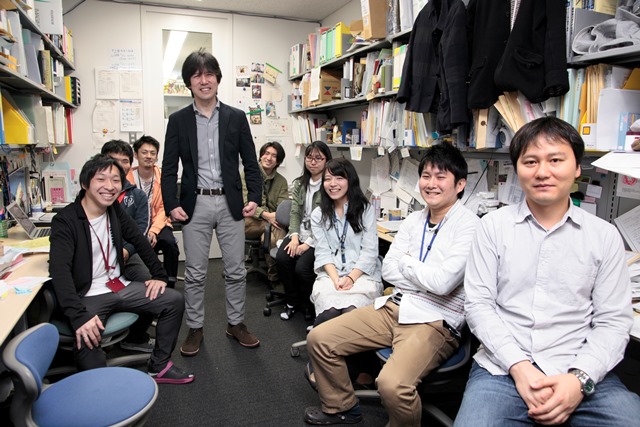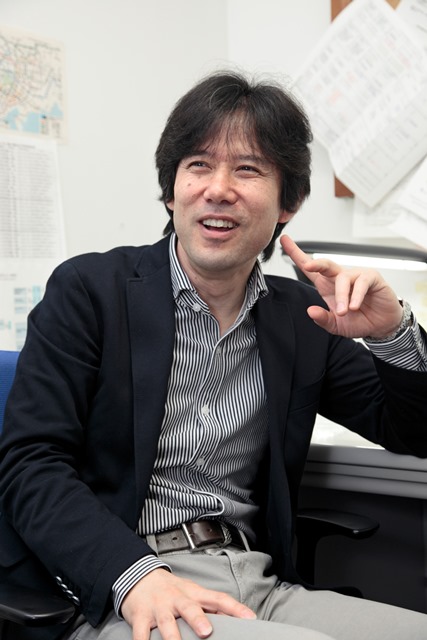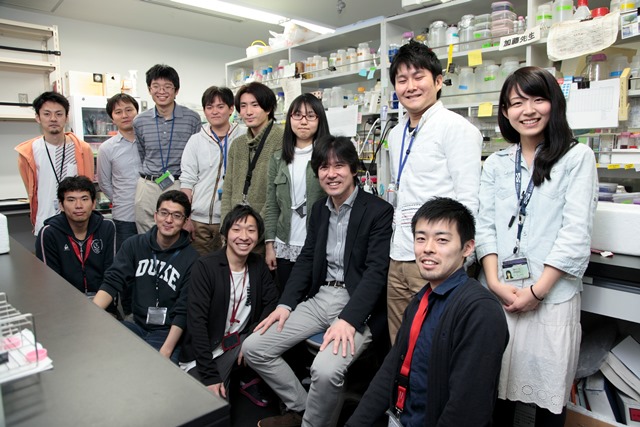Waseda Frontline Research Vol.1, Part 4 – Changing the future of medicine with epigenetics
Mon, Jul 27, 2015-
Tags
Epigenetics pioneer Hitoshi Kurumizaka
Changing the future of medicine with epigenetics

Members of the Kurumizaka Research Lab at TWIns, the Waseda University Center for Advanced Biomedical Sciences
In the final issue of this series we talk to Dr. Hitoshi Kurumizaka about his background and how he became an epigenetics researcher. Professor Kurumizaka passionately discusses the future of epigenetics, its effect on our lives, and the possibility of cancer research in the future.
Living as a researcher in the United State – a turning point
Being a guitarist, I came to Tokyo as a student hoping to become a professional musician. However, before I knew it I had fallen in love with DNA research. I got married in college and went to the United States at the age of 28 where I worked at the National Institutes of Health (NIH) as a postdoctoral fellow. It was around this time that I first encountered epigenetics research.
I was a student of Dr. Alan Wolffe, the original epigenetics researcher. He devised an innovative prototype in genomic editing technology which is referred to today as Zinc Finger Nucleases, or ZFNs. Under Alan I conducted what was considered cutting-edge research on chromatin at the time and between 1995 and 1997 succeeded in reconstructing a nucleosome using artificially-produced proteins. In those days, the only other person besides me who was capable of creating nucleosomes through genetic engineering was Dr. Karolin Luger who was working in Dr. Timothy Richmond’s lab at the Swiss Federal Institute of Technology (currently a professor at Colorado State University).
I continued to expand my research after returning to Japan to incorporate the study of centromere structure and chromatin’s dynamic properties. I wish I could show my accomplishments to Alan. Unfortunately, he passed away in a car accident six years after we met at the young age of 41. This was such a tremendous loss. If Alan’s technology had been used in genetic treatment, I’m sure he would have had a good chance at winning the Nobel Prize.
Will epigenetics cure cancer?
If epigenetics research sheds light on the mechanisms of life, I believe this will lead to a change in the concept of genetic diseases.
The genetic disease that poses the greatest struggle to human beings is cancer. Researchers all over the world are looking for the primary causes of cancer but to no avail. I believe one of the fundamental causes is chromatin structural change. In other words, if there are some problems with chromatin’s dynamic movements and as a result abnormalities occur—such as DNA that should be read going unread—it may result in mutations that develop into cancer.
Using my lab’s technology, it is possible to compare the structures of chromatin that work normally and those that do not. This can reveal how the abnormal dynamics of chromatin are related to cancer. It may even be possible to discover the mechanism from which cancer develops. If we can apply this knowledge to medicine this may lead to a future where we understand all sorts of genetic diseases, from cancer and refractory diseases such as amyotrophic lateral sclerosis (ALS) to various neuropsychiatric diseases.
In a future with advanced medical care for such genetic diseases there would be no more need for surgeries and daily hospital visits that cause stress to a patient’s body. It would become possible to learn at the time of birth the entire map of diseases that a person will suffer in the future. As for treatment, drugs would be placed inside a capsule and patients would take them on a daily basis. With these simple steps they would be able to control the expression of genes related to diseases throughout their lifetime. Of course patients would need to continue to take these drugs as long as they live, but if taking medication was a lifelong habit it would be the same as eating a meal. Just by taking these capsules, many people who otherwise would have suffered genetic diseases would be able to lead healthy lives. I believe I am conducting the necessary, basic research for society and this future.
Introducing new things to the world is a researcher’s duty
Lastly, I would like to talk a little bit about the joys of research. Nothing brings me more joy than discovering new things. There are so many discoveries in epigenetics we want to communicate to people around the world and for this reason I find great joy in writing research papers. I hope my discoveries and views can be conveyed to many people in a way that’s easy to understand.
My research is supported by my laboratory staff and their teamwork. Of course it is cool if you become globally recognized from performing research and writing a paper by yourself. This is something all researchers dream of. On the other hand, all researchers know how difficult that is. If I had to choose between taking ten years to accomplish research in solitude and taking one year to accomplish research while having fun working with four other people, I would choose the latter.
My research approach resonates with many Waseda students. As a result, many students with willpower and lofty aspirations come directly to me. I have spent twelve productive years together with these aspiring young researchers and enjoy every minute of it. Our university has an abundance of students with great passion, regardless of their faculty or specialty—science or non-science—and who have a burning desire to make a difference with their lives and live life to the fullest. In hopes that many students will one day utilize their unique knowledge and determination on the global stage, I will continue to do my best, today and tomorrow, to deliver a new and exciting future to people around the world.
Profile

Hitoshi Kurumizaka
1989: Graduated from the School of Pharmacy, the Tokyo University of Pharmacy and Life Sciences; licensed pharmacist.
1995: Completed Ph.D. at the Graduate School of Science and Engineering, Saitama University.
1995–1997: Postdoctoral Fellow, US National Institutes of Health (NIH).
1997–2003: Researcher, RIKEN.
2003–2007: Assistant Professor, Department of Electrical Engineering and Bioscience, Faculty of Science and Engineering, Waseda University.
2001–2007: Visiting Associate Professor, Department of Science of Biological Supramolecular Systems, Graduate School of Integrated Science, Yokohama City University.
2007–2008: Associate Professor, Department of Electrical Engineering and Bioscience, School of Advanced Science and Engineering, Waseda University.
2008–2012: Visiting Professor, Graduate School of Integrated Science, Yokohama City University.
2003–2015: Visiting Researcher, RIKEN.
2012 to present: Guest Professor, Graduate School of Medical Life Science, Yokohama City University.
2008 to present: Professor, Department of Electrical Engineering and Bioscience, School of Advanced Science and Engineering, Waseda University.














